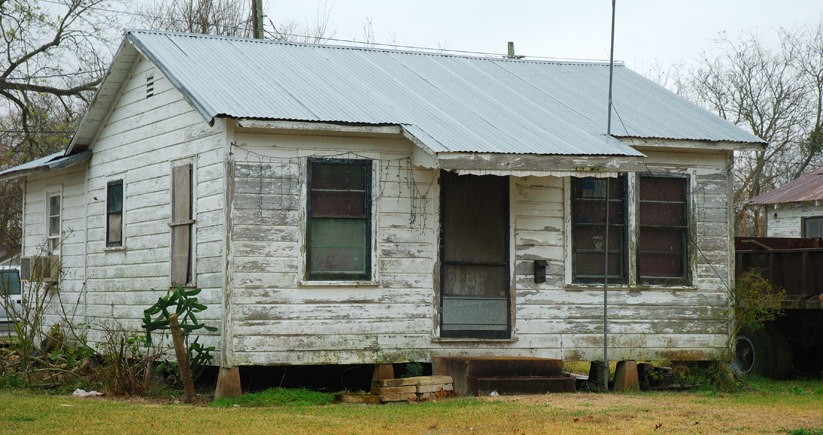
It's no secret that the Southern "Black Belt" and Mississippi Delta are among the poorest places in the country. Less widely known is what many experts believe is a root cause of this entrenched poverty: a phenomenon known as heirs' property.
Heirs' property results when a landowner dies without a properly recorded, or probated, will. The property has a muddled ownership structure split among multiple relatives, sometimes hundreds, who are often scattered geographically. This situation can result in court-ordered sales of property with cultural and historical significance, difficulty transferring wealth between generations, and inability to access post-disaster assistance that would be available to owners with clear title to their land.
"I believe this is an underlying cause of rural poverty in the Black Belt," said Conner Bailey, a rural sociologist at Auburn University who has studied heirs' property issues for decades, at a recent event cosponsored by the Federal Reserve Bank of Atlanta and the U.S. Forest Service's Southern Research Station.
The Black Belt is an area that by Bailey's definition encompasses some 365 counties in the Mississippi Delta, central Alabama and Georgia, and coastal South Carolina. These are counties where African Americans make up 25 percent or more of the population, about double the national proportion.
Heirs' property is especially prevalent in the rural South. But it is also common in Appalachia and other rural areas, in some urban areas, and on Indian reservations.
Heirs' property is intertwined with many issues of interest to the Atlanta Fed's Community and Economic Development (CED) unit, explains Ann Carpenter, a senior CED adviser who studies affordable housing and neighborhood stabilization. Heirs' property complications exacerbate persistent poverty and destabilize neighborhoods.
Listen to a special episode of the Economy Matters podcast devoted to issues surrounding heirs’ property.
In fact, characteristics of many heirs' property owners and their communities—poverty, low educational attainment, and minority status—align closely with criteria comprising the Centers for Disease Control and Prevention's social vulnerability index, Scott Pippin of the University of Georgia's Carl Vinson Institute of Government said during the event. The index is a tool to help emergency response planners and public health officials identify communities that will most likely need support during or after natural disasters and other crises.
The focus of the Atlanta Fed's CED unit is low- to moderate-income communities. Heirs' property is a particular problem in such communities in the Southeast, Carpenter says. For these reasons, the Atlanta Fed recently convened its first event to explore the problem. Several of the nation's leading researchers and practitioners who aid owners gathered in Atlanta to discuss their work and suggest steps to combat the causes and consequences of heirs' property.

The Atlanta Fed’s Ann Carpenter speaks during the heirs’ property event.
Heirs' property hard to quantify precisely
It's a tough issue for several reasons. For one, no one knows exactly how widespread the problem is. While there is no precise measure of the quantity of heirs' property, the best recent estimates peg the range at a third to half of all land owned by African Americans in the rural South, says Bailey. He figures heirs' property comprises some $6 billion of real estate in the Black Belt South alone.
"Fractionated ownership," which means a piece of land that is owned by many different people as common property, underlies many problems stemming from heirs' property, says Thomas Mitchell, a Texas A&M law school and agricultural economics professor and a legal expert on heirs' property.
Many property owners think having multiple owners is a safeguard against a forced sale. But the opposite is true, Mitchell pointed out at the event. Overall, the laws governing sales and other matters relating to heirs' property ownership have often worked to undermine its preservation, though the laws vary in some important ways from state to state.
Traditionally, in most states, if one owner wants to sell a parcel against the wishes of the other common owners, then a judge could order a forced sale based strictly on financial considerations. Though judges once were supposed to order the forced-sale option only in extraordinary situations, the law gradually changed to enable them to order forced sales as a routine matter. As a result, this situation arises fairly regularly. It can involve an owner who lives in a distant state and doesn't share fellow owners' practical and emotional bonds to the land. Forced sales also often result when a non-family member acquires an interest in the property specifically to seek a forced sale, Mitchell says.

Forced sales are not the only issue. Fractionated ownership complicates decisions regarding use of land—say, to grow timber or crops, or sell mineral rights—and stymies the transfer of wealth between generations. It also makes it next to impossible for heirs' property owners to take advantage of federal and non-federal governmental programs, energy conservation grants, and other assistance or to secure loans from governmental or private lenders.
The reason is that ambiguous ownership makes it hard to show clear title to property. For example, after Hurricane Katrina, thousands of Louisiana residents whose homes were heirs' property were unable to secure assistance from the federally funded Road Home Program because they couldn't definitively show that they owned their real estate.
Millions of dollars in Road Home funds went uncollected for lack of clear title resulting from heirs' property complications, Mitchell says.
Lack of wills more common among African Americans
One reason heirs' property plagues black communities in particular is a difference in will writing. While the overall U.S. rate of "intestacy"—cases of adults dying without a probated will—is 43 percent, the rate is 76 percent among African Americans and 36 percent among whites, Mitchell says (see the infographic).

Many heirs' property situations result from owners who lack sophistication in legal matters and have little access to legal services, Mitchell says. Robert Zabawa, a Tuskegee University expert on minority farming and heirs' property, notes that for many landowners with few resources, writing and properly recording a will seems like a daunting process, and they simply choose to avoid it.
Not a high-profile cause
The event held by the Atlanta Fed and the Forest Service marked a rare gathering of heirs' property experts, participants said. Attention paid to heirs' property has waxed and waned over the decades, Carpenter says. A paper regarded as the seminal work on the topic dates to the 1980s. A small group of mostly academics, many of whom were at the Atlanta meeting, have continued to research heirs' property in particular locales or on various aspects of the issue. But generally it is not as much of a concern as it ought to be, noted speakers at the Atlanta event. Areas where it is prevalent tend to have stubbornly low property values and residents with little political influence, factors that limit the incentive to address heirs' property concerns. In fact, since he began studying heirs' property in the late 1990s, Mitchell says many people expressed sympathy but warned him he was wasting his time proposing reforms. They figured nothing would ever change because those most affected lack influence.
Promising signs
There are promising signs. On the legal front, Mitchell served as the principal drafter of a model state statute aimed at strengthening property rights for heirs' property owners to make their ownership more secure and to better protect their real estate wealth. Ten states have adopted the measure since 2011, when the model statute could first be considered by state legislatures, including Alabama, Arkansas, Texas, Georgia and South Carolina. The statute's provisions, for example, would make forced sales less likely.
Unlike most existing laws, the model statute requires the court to consider not just financial factors but also the history of ownership, cultural value of the property, and whether a sale would render owners living on the land homeless. If a forced sale is appropriate, Mitchell says, then the law asks that property be marketed to maximize the sales price rather than sold via auction on the courthouse steps, as forced sales are typically conducted. Such sales have, in many instances, resulted in fire sale prices.
Other efforts have helped heirs' property owners. A four-year-old program by the U.S. Endowment for Forestry and Communities has helped 662 landowners create 247 forest management programs and 92 wills and estate plans, according to Alan McGregor, vice president for communities at the endowment. Meanwhile, several other programs across the country offer legal services and other aid, including the Georgia Heirs Property Law Center, the South Carolina-based Center for Heirs' Property Preservation, and the Indian Land Tenure Foundation.

Alan McGregor of the U.S. Endowment for Forestry and Communities spoke at the event on efforts to help the owners of heirs' properties.
The nonprofit Louisiana Appleseed championed legislation in that state making it less onerous to establish clear title to properties. The law so far has helped save 740 homes in the New Orleans area, says Christy Kane, Louisiana Appleseed's executive director.
At the Atlanta event, Kane said she has received a mixed response in efforts to educate citizens and policymakers across Louisiana about heirs' property ownership complications. But people tend to pay more attention when a disaster strikes.
"It's just not important," she says, "until it's important."




